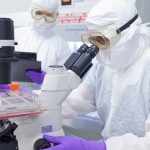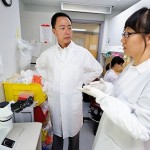Tag Animal research
Impulsivity, rewards and Ritalin: monkey study shows tighter link
Even as the rate of diagnosis has reached 11 percent among American children aged 4 to 17, neuroscientists are still trying to understand attention deficit hyperactivity disorder (ADHD). One classic symptom is impulsivity — the tendency to act before thinking.
Vet med scientists find better, safer treatments for hoof disease in cattle
For almost 40 years, digital dermatitis has plagued cattle throughout the world. Also called heel warts, these painful hoof lesions limit the amount of time cows can stand and feed, which can hinder animal welfare and food production. The disease can be found on almost every beef and dairy farm in North America, so it has a significant economic impact on those industries in the United States.
H5N1 bird flu genes show nature can pick worrisome traits
In a study published today (Oct. 23, 2013) in Nature Communications, an international team of researchers shows how evolution can favor mutations that make avian flu more transmissible in mammals.
Biomanufacturing center takes central role in developing stem-cell therapies
Developing a new drug takes enormous amounts of time, money and skill, but the bar is even higher for a promising stem-cell therapy. Many types of cells derived from these ultra-flexible parent cells are moving toward the market, but the very quality that makes stem cells so valuable also makes them a difficult source of therapeutics.
Target of animal rights protests kicks off animal research ethics forum
Any research that includes animals presents ethical questions, but they are questions Dario Ringach believes we rarely address together.
From football to flies: lessons about traumatic brain injury
Faced with news of suicides and brain damage in former professional football players, geneticist Barry Ganetzky bemoaned the lack of model systems for studying the insidious and often delayed consequences linked to head injuries.
UW-Madison Statement in Response to Bill Maher Robocalls
It is no surprise that People for the Ethical Treatment of Animals (PETA) continues its opposition to biomedical science through their sustained efforts to draw attention to research to which they object. PETA has tried mightily to stop important work on hearing at UW–Madison by making repeated, unsubstantiated and false claims about the work and its conduct.
Mouse studies reveal promising vitamin D-based treatment for MS
A diagnosis of multiple sclerosis (MS) is a hard lot. Patients typically get the diagnosis around age 30 after experiencing a series of neurological problems such as blurry vision, wobbly gait or a numb foot. From there, this neurodegenerative disease follows an unforgiving course.
New gene repair technique promises advances in regenerative medicine
Using human pluripotent stem cells and DNA-cutting protein from meningitis bacteria, researchers from the Morgridge Institute for Research and Northwestern University have created an efficient way to target and repair defective genes.
Study puts troubling traits of H7N9 avian flu virus on display
The emerging H7N9 avian influenza virus responsible for at least 37 deaths in China has qualities that could potentially spark a global outbreak of flu, according to a new study published today (July 10, 2013) in the journal Nature.
Waisman scientists model human disease in stem cells
Many scientists use animals to model human diseases. Mice can be obese or display symptoms of Parkinson's disease. Rats get Alzheimer's and diabetes. But animal models are seldom perfect, and so scientists are looking at a relatively new type of stem cell, called the induced pluripotent stem cell (iPS cell), that can be grown into specialized cells that become useful models for human disease.
PETA’s Mixed Martial Assault on Scientists
From the website, Speaking of Research.
Ned Kalin – revealing disorders of the brain
Dr. Ned Kalin, chair of the Department of Psychiatry, is an accomplished biological psychiatrist whose research focuses on anxiety. Through imaging studies and understanding the genetic and environmental components of mental illness, his lab is working toward discoveries that can form the basis of early interventions to treat children who are at risk of developing long-term anxiety and related psychiatric disorders.
$18 million to study deadly secrets of flu, Ebola, West Nile viruses
In an effort to sort out why some viruses such as influenza, Ebola and West Nile are so lethal, a team of U.S. researchers plans a comprehensive effort to model how humans respond to these viral pathogens.
Engineered stem cell advance points toward treatment for ALS
MADISON, Wis. — Transplantation of human stem cells in an experiment conducted at the University of Wisconsin–Madison improved survival and muscle function in rats used to model ALS, a nerve disease that destroys nerve control of muscles, causing death by respiratory failure.
Adult cells transformed into early-stage nerve cells, bypassing the pluripotent stem cell stage
A University of Wisconsin–Madison research group has converted skin cells from people and monkeys into a cell that can form a wide variety of nervous-system cells - without passing through the do-it-all stage called the induced pluripotent stem cell, or iPSC.
Stem cell transplant restores memory, learning in mice
For the first time, human embryonic stem cells have been transformed into nerve cells that helped mice regain the ability to learn and remember.
Researchers discover the brain origins of variation in pathological anxiety
New findings from nonhuman primates suggest that an overactive core circuit in the brain, and its interaction with other specialized circuits, accounts for the variability in symptoms shown by patients with severe anxiety.
Transplanted brain cells in monkeys light up personalized therapy
For the first time, scientists have transplanted neural cells derived from a monkey's skin into its brain and watched the cells develop into several types of mature brain cells, according to the authors of a new study in Cell Reports. After six months, the cells looked entirely normal, and were only detectable because they initially were tagged with a fluorescent protein.









